Arts & Entertainment
Rules of the club
Funny new Arena production explores book group drama
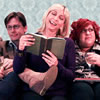
‘The Book Club Play’
Through Nov. 6
Arena Stage
1101 Sixth Street, SW
$45-$85
202-554-9066
arenastage.org
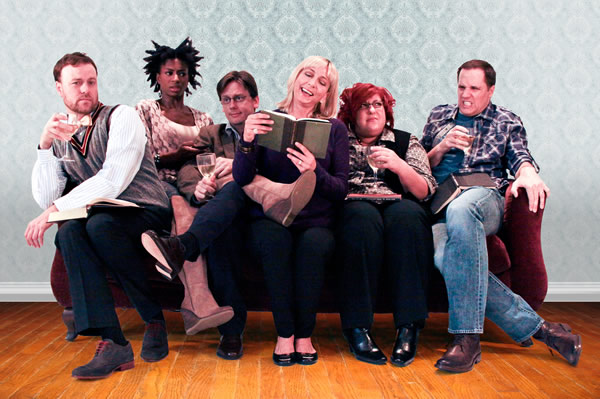
From left, Tom Story, Rachael Holmes, Fred Arsenault, Kate Eastwood, Ashlie Atkinson and Eric Messner in ‘The Book Club Play’ at Arena Stage. (Photo by Scotty Beland; courtesy Arena Stage)
Ana’s book club is very exclusive. For the longest time there were only four members. A fifth was admitted after passing a private vetting process.
The group’s weekly gatherings have remained the same — comfortably social and predictably gratifying. But all that is about to change. When the club becomes the subject of a documentary film and a controversial new member is added to the mix, this cozy little literary haven is ripped apart at its bindings.
Karen Zacarías’ “The Book Club Play” draws from that popular Oprah-approved literary phenomenon where readers gather in private homes to presumably discuss assigned books. Some groups are quite serious while others are thinly veiled excuses for eating, talking and drinking wine. Whatever the case, judging from the audience’s knowing reactions to the comedy at a recent matinee performance in Arena Stage’s intimate Cradle space, many of us have been there.
Set in Ana’s comfortable living room, the action begins with members agreeing to allow their club to be filmed as a highbrow documentarian’s latest project. Pretentious and controlling Ana (Kate Eastwood Norris), a newspaper columnist and clearly the group’s crowned monarch, is all for it. Other members including dramatic bachelor Will (Tom Story), Ana’s mostly easy going husband Ron (Eric M. Messner), and Lily (Rachael Holmes), a young editor and the club’s sole ethnic minority, are equally smitten with the idea. Only Jen (Ashlie Atkinson), a harried paralegal and Bronte sisters fan is hesitant, but the mere thought of absenting herself from book club throughout filming is unthinkable, so she signs off on the release too.
Initially the ever-present camera prompts awkward but humorous responses: Of course, Ana strives (not always successfully) to appear correct – politically and otherwise. Her husband, a former college quarterback, is prone to a bit of preening and sideways glances. But eventually all grow comfortable with being filmed and some hilarious moments spontaneously unfold like when Lily assumes Will is gay, and Ron sadly identifies with discontentedly married Newland in Edith Wharton’s “Age of Innocence.”
There’s a turning point in the play: friendly Jen flouts the rules by inviting a neighbor to book club without first getting members’ approval. Alex (Fred Arsenault), a slightly disheveled (note the mismatched socks) comparative lit professor, is mending a broken heart by rediscovering his passion for books. His evolving theory is that to be a truly culturally conversant person one must read classics and bestsellers alike. This doesn’t go down too well with elitists Ana and Will, but the club goes ahead with the heretofore unthinkable — they read “The Da Vinci Code.”
Incredibly, Will loves the lowbrow novel. In fact, he credits the mega-seller with enabling him to connect with his true sexuality. Suddenly the museum curator who grew up voraciously reading “Winnie the Pooh” and “Paddington Bear” acknowledges his passion for two legged bears — big, strapping, hairy men. (He sees himself as more of an otter than a bear — still hairy but smaller.) Simultaneously, autocratic Ana feels her grasp on the club’s leadership quickly weakening and she’s not quite sure what to do with that.
Between scenes, six filmed bibliophilic vignettes featuring each of the cast members playing varied booklovers (butch beautician, Wal-Mart manager, crass literary agent, shark attack survivor and skydiving granny) completely different from their characters are projected against the back of Donald Eastman’s spare set. Ashlie Atkinson is especially funny as a tough lady inmate who distributes books but doesn’t read. She adheres to that old adage about not dabbling in what you deal.
Yes, the characters are stock — uptight wife, henpecked husband, precious gay guy, etc. — and yes, “The Book Club Play’s” humor can be sitcom caliber. But Arena’s fresh and snappy production with its excellent cast and Molly Smith’s confident staging nicely makes the most of both the play’s more thoughtful and laugh-out-loud moments.
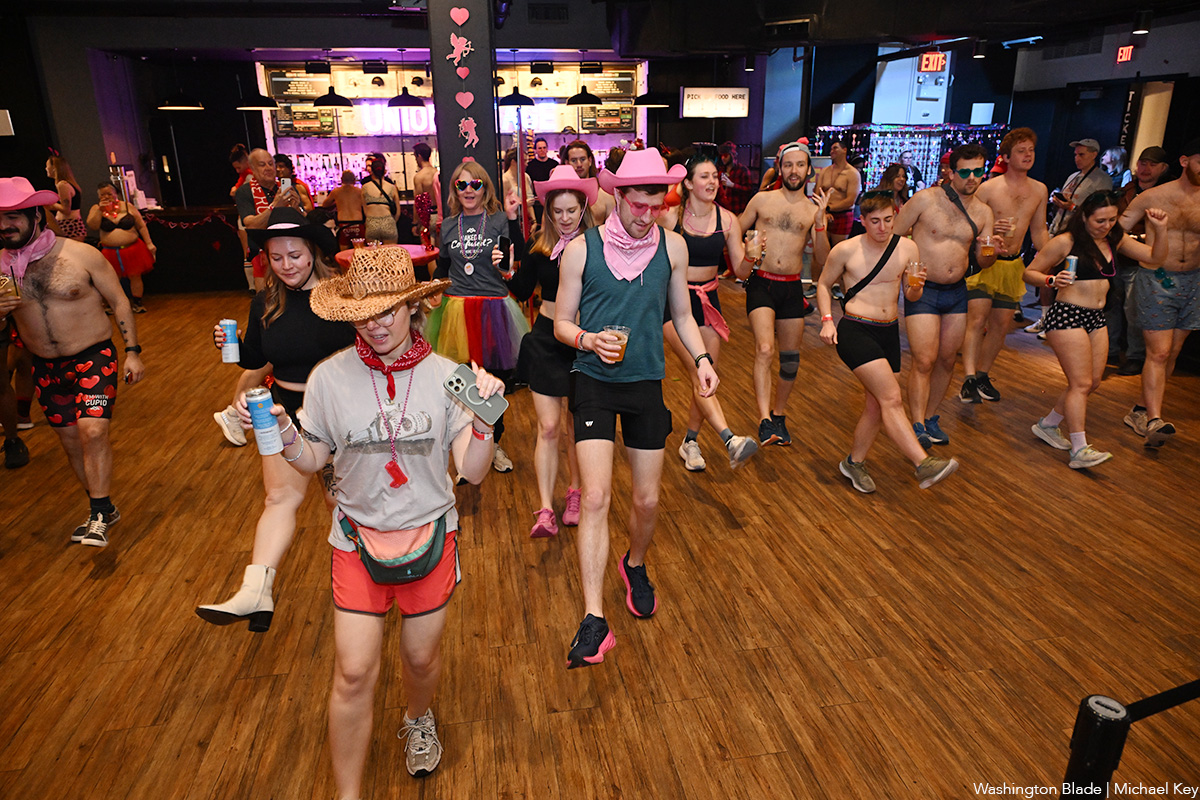
Cupid’s Undie Run, an annual fundraiser for neurofibromatosis (NF) research, was held at Union Stage and at The Wharf DC on Saturday, Feb. 21.
(Washington Blade photos by Michael Key)
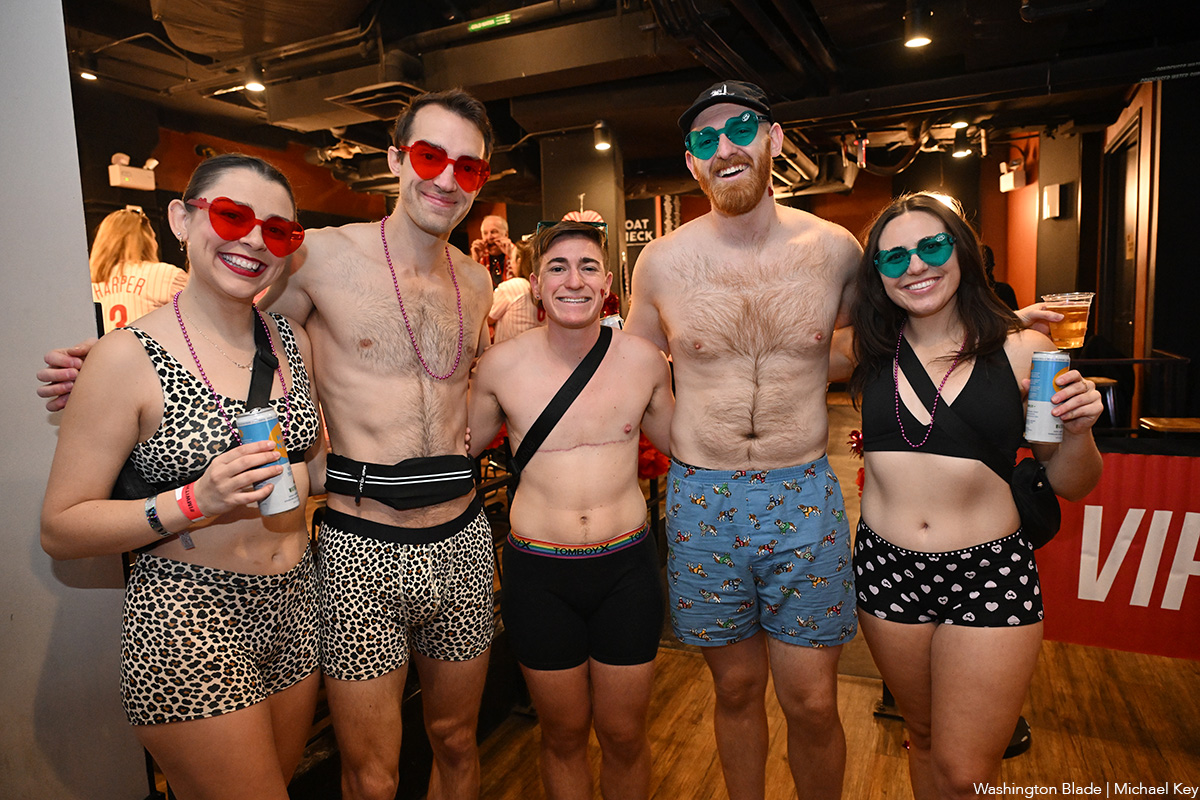

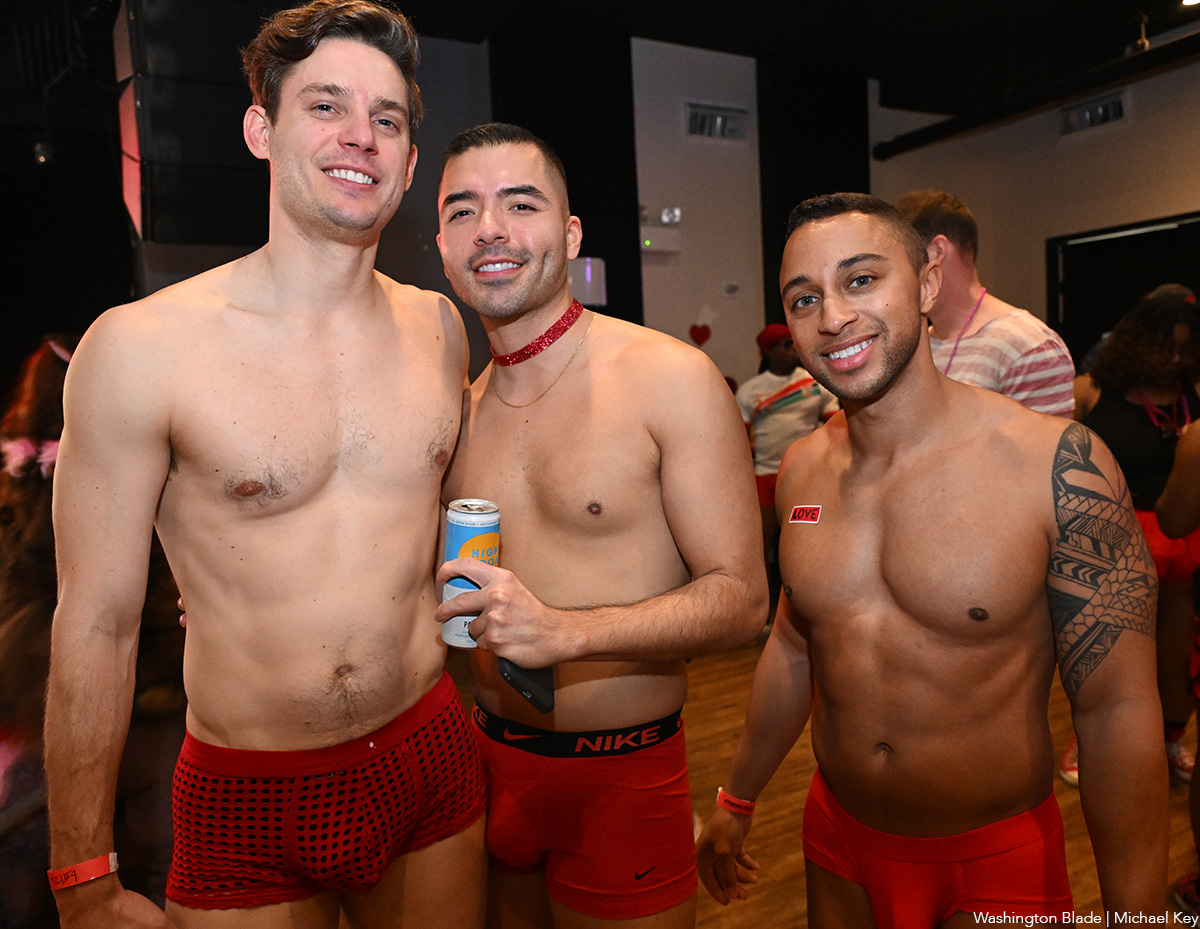


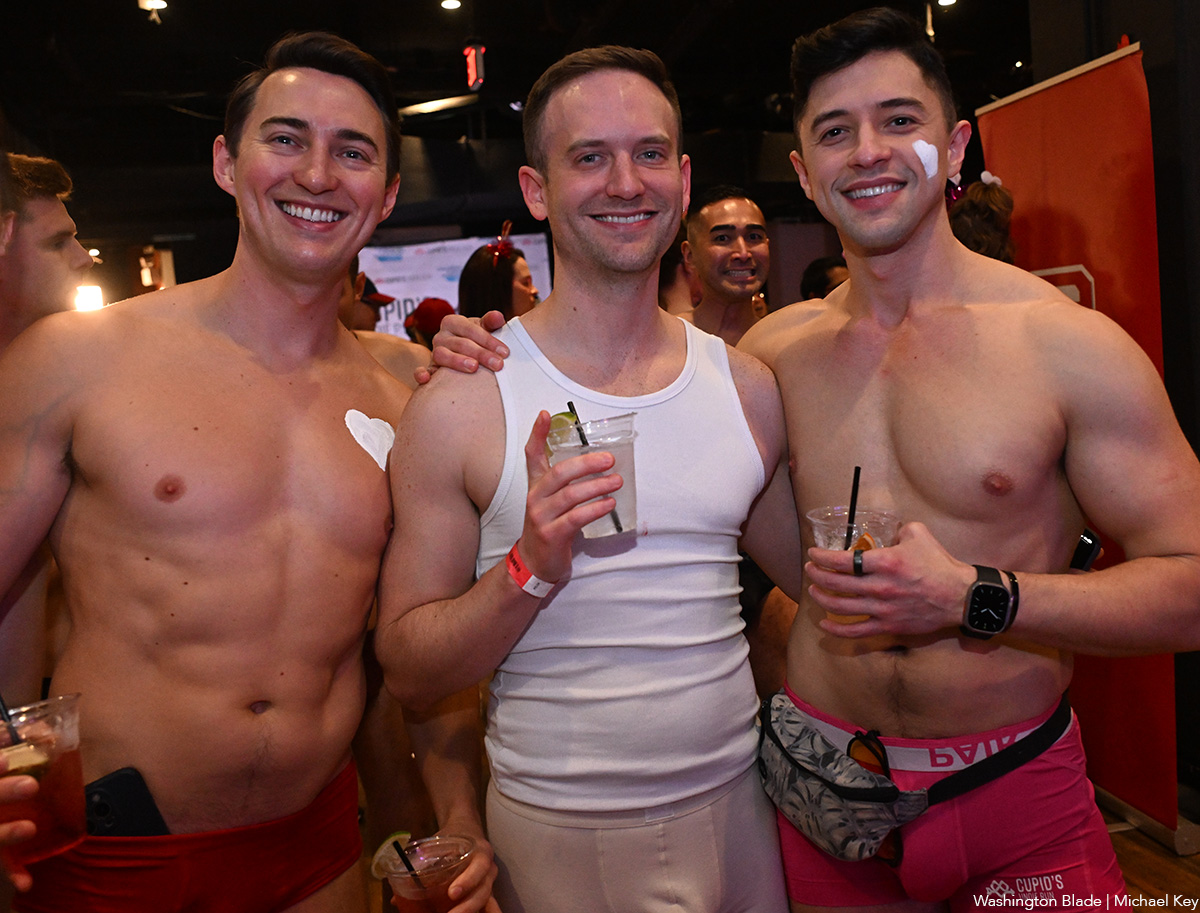


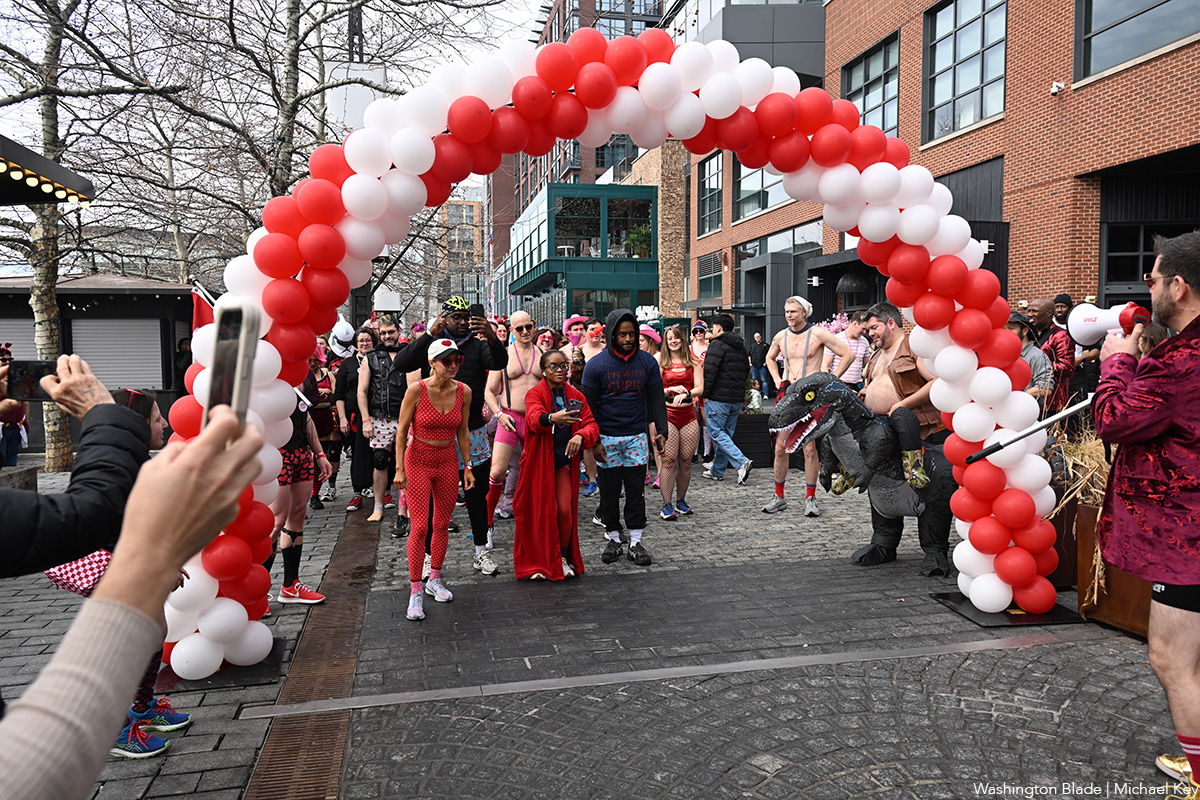
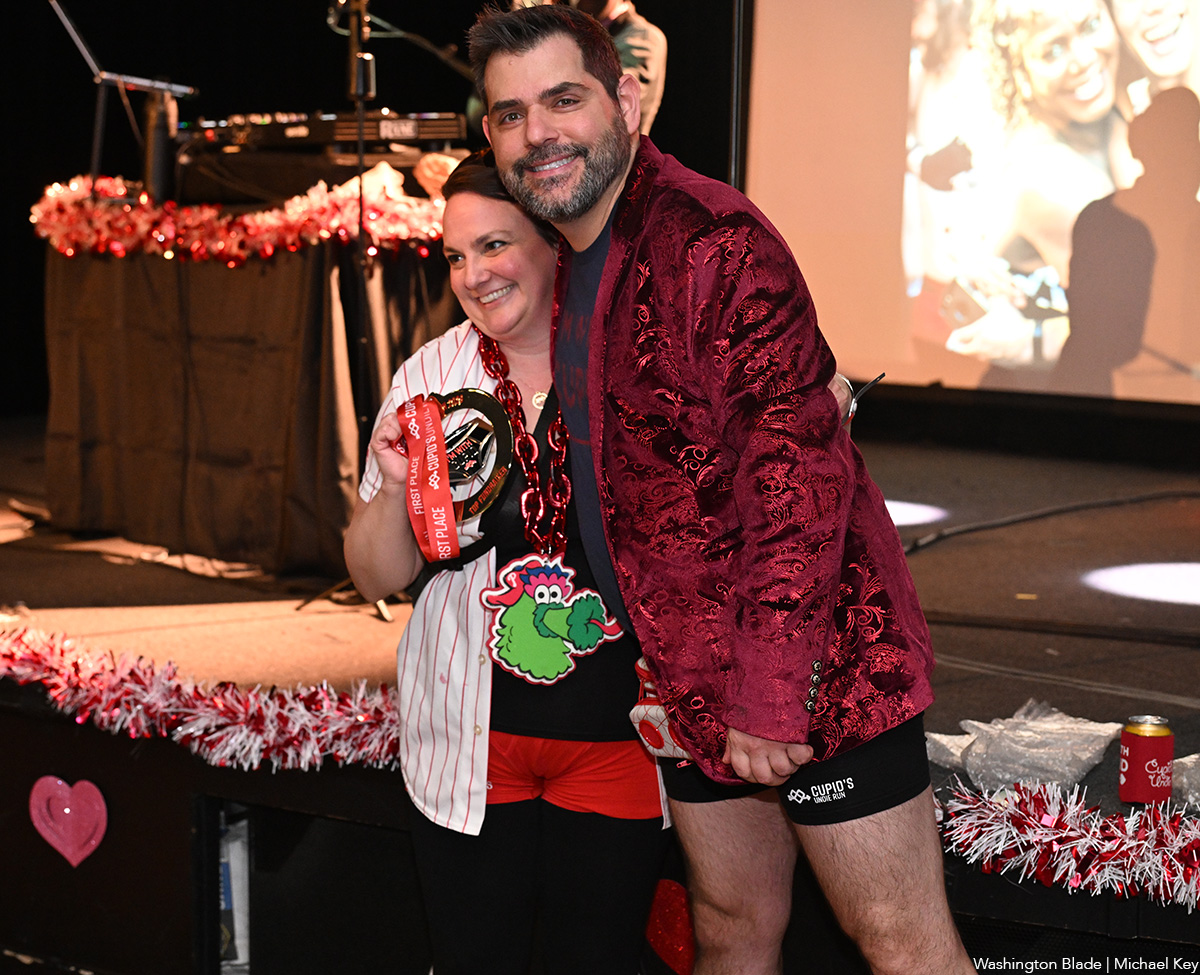
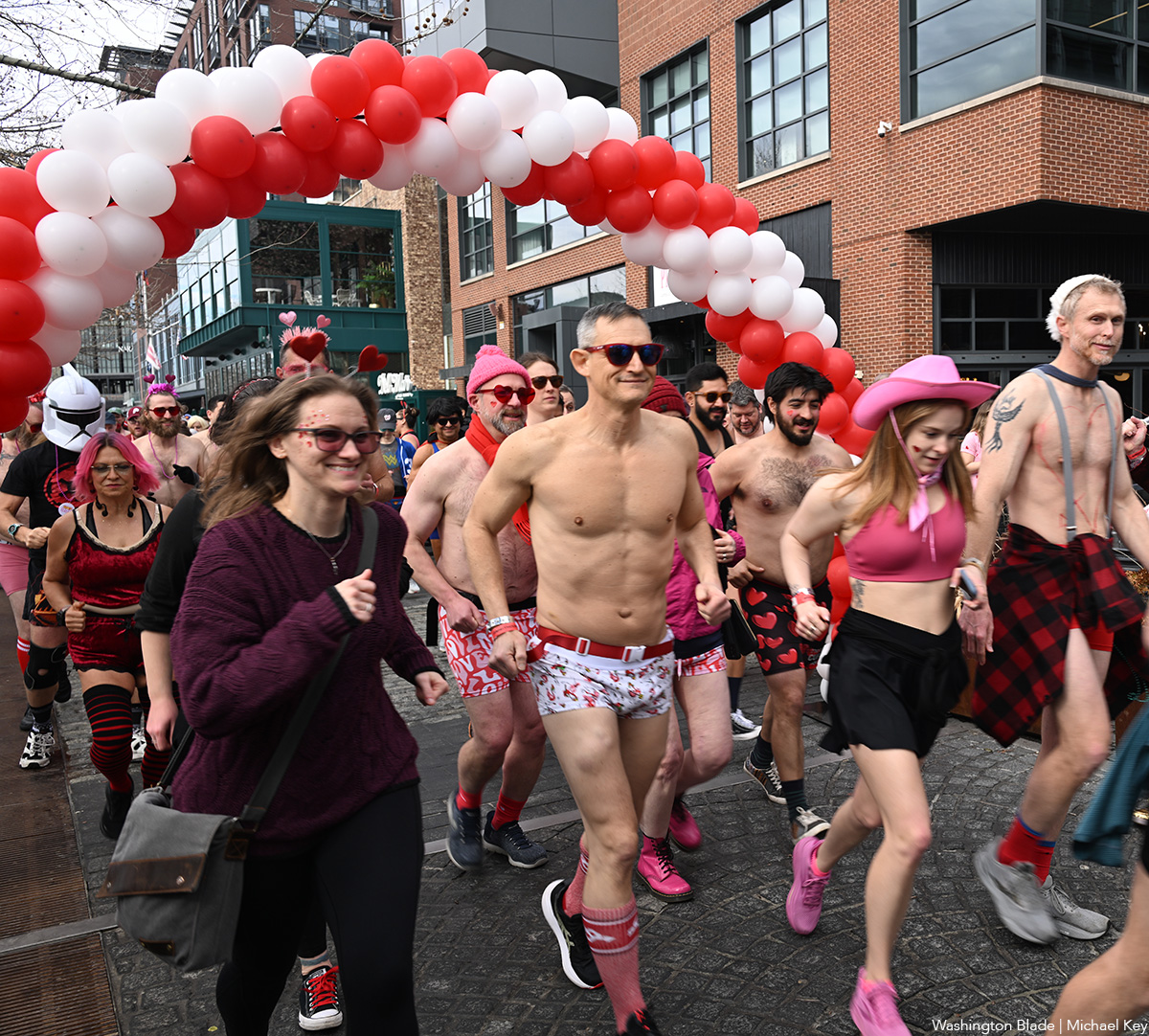

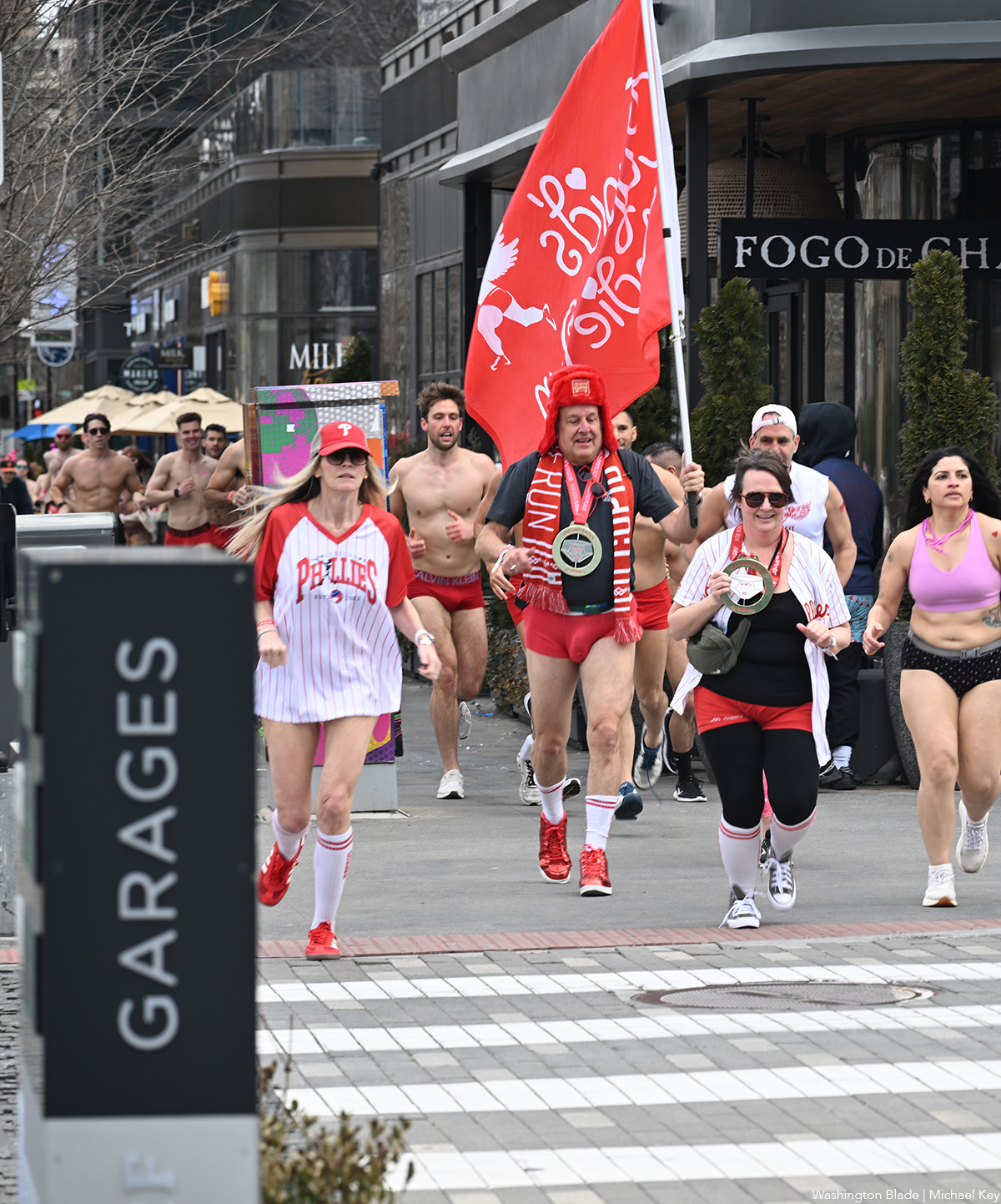

Sweat DC is officially expanding to Shaw, opening a new location at 1818 7th St., N.W., on Saturday, March 28 — and they’re kicking things off with a high-energy, community-first launch event.
To celebrate, Sweat DC is hosting Sweat Fest, a free community workout and social on Saturday, March 14, at 10 a.m. at the historic Howard Theatre. The event features a group fitness class, live DJ, local food and wellness partners, and a mission-driven partnership with the Open Goal Project, which works to expand access to youth soccer for players from marginalized communities.
For more details, visit Sweat DC’s website and reserve a spot on Eventbrite.

Friday, Feb. 20
Center Aging Monthly Luncheon with Yoga will be at noon at the D.C. LGBTQ+ Community Center. Email Mac at [email protected] if you require ASL interpreter assistance, have any dietary restrictions, or questions about this event.
Trans and Genderqueer Game Night will be at 7 p.m. at the D.C. Center. This will be a relaxing, laid-back evening of games and fun. All are welcome! We’ll have card and board games on hand. Feel free to bring your own games to share. For more details, visit the Center’s website.
Go Gay DC will host “First Friday LGBTQ+ Community Social” at 7 p.m. at Hotel Zena. This is a chance to relax, make new friends, and enjoy happy hour specials at this classic retro venue. Attendance is free and more details are available on Eventbrite.
Saturday, Feb. 21
Go Gay DC will host “LGBTQ+ Community Brunch” at 11 a.m. at Freddie’s Beach Bar & Restaurant. This fun weekly event brings the DMV area LGBTQ community, including allies, together for delicious food and conversation. Attendance is free and more details are available on Eventbrite.
LGBTQ People of Color will be at 7 p.m. on Zoom. This peer support group is an outlet for LGBTQ People of Color to come together and talk about anything affecting them in a space that strives to be safe and judgement free. There are all sorts of activities like watching movies, poetry events, storytelling, and just hanging out with others. For more information and events, visit thedccenter.org/poc or facebook.com/centerpoc.
Sunday, Feb. 22
Queer Talk DC will host “The Black Gay Flea Market” at 1 p.m. at Doubles in Petworth. There will be more than 15 Black queer vendors from all over the DMV in one spot. The event’s organizers have reserved the large back patio for all vendors, and the speak easy for bar service, which will be serving curated cocktails made just for the event (cash bar.) DJ Fay and DJ Jam 2x will be spinning the entire event. For more details, visit Eventbrite.
Monday, Feb. 23
“Center Aging: Monday Coffee Klatch” will be at 10 a.m. on Zoom. This is a social hour for older LGBTQ adults. Guests are encouraged to bring a beverage of choice. For more information, contact Adam at [email protected].
Tuesday, Feb. 24
Coming Out Discussion Group will be at 7 p.m. on Zoom. This is a safe space to share experiences about coming out and discuss topics as it relates to doing so — by sharing struggles and victories the group allows those newly coming out and who have been out for a while to learn from others. For more details, visit the group’s Facebook.
Genderqueer DC will be at 7 p.m. on Zoom. This is a support group for people who identify outside of the gender binary, whether you’re bigender, agender, genderfluid, or just know that you’re not 100 percent cis. For more details, visit genderqueerdc.org or Facebook.
Wednesday, Feb. 25
Job Club will be at 6 p.m. on Zoom upon request. This is a weekly job support program to help job entrants and seekers, including the long-term unemployed, improve self-confidence, motivation, resilience and productivity for effective job searches and networking — allowing participants to move away from being merely “applicants” toward being “candidates.” For more information, email [email protected] or visit thedccenter.org/careers.
Asexual and Aromantic Group will meet at 7 p.m. on Zoom. This is a space where people who are questioning this aspect of their identity or those who identify as asexual and/or aromantic can come together, share stories and experiences, and discuss various topics. For more details, email [email protected].
Thursday, Feb. 26
The DC Center’s Fresh Produce Program will be held all day at the DC Center. To be more fair with who is receiving boxes, the program is moving to a lottery system. People will be informed on Wednesday at 5 p.m. if they are picked to receive a produce box. No proof of residency or income is required. For more information, email [email protected] or call 202-682-2245.
Virtual Yoga Class will be at 7 p.m. on Zoom. This free weekly class is a combination of yoga, breathwork and meditation that allows LGBTQ community members to continue their healing journey with somatic and mindfulness practices. For more details, visit the DC Center’s website.




















